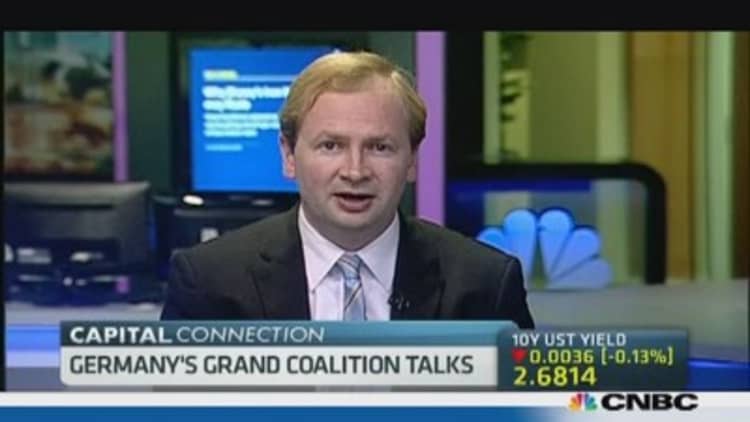Chancellor Angela Merkel is likely to pick a new coalition partner this week before moving on to detailed negotiations that could produce a new German government within about two months.
While the rest of the Europe waiting for clarity in its pivotal economy, Merkel has moved slowly since the Sept. 22 election towards making a deal with her two potential partners. She meets the Social Democrats on Monday and the Greens on Tuesday.
Merkel's Christian Democratic Union (CDU) and its Bavarian sister party, the Christian Social Union (CSU), emerged as the dominant force from the election but, with 311 of the 631 seats in the Bundestag (lower house), they lack a majority.
She had a first round of preliminary talks last week with the SPD, the largest opposition party with 193 seats, and the Greens, the smallest with 63 seats. No decisions were reached and neither party showed much desire to join her after her last partners, the Free Democrats, failed to win enough votes to remain in parliament.
The battered SPD is seen as Merkel's most likely ally, in a revival of the right-left 'grand coalition' that ruled from 2005-09. But Germany's oldest party is split on whether to join Merkel again after seeing its support crumble as her junior partner before.
"Monday's talks will be of decisive importance to answer the question of whether there is a stable foundation for full coalition negotiations," said SPD deputy leader Andrea Nahles.
The possibility that talks could take months worries Germany's European partners, who fear the negotiations could delay decisions on measures to fight the euro zone crisis - such as a plan for banking union.
Merkel has kept the option of a coalition with the Greens alive, despite resistance from the CSU. Tensions are high between the CSU and the Greens, a left-leaning party with roots in the 1970s peace and anti-nuclear movements.
Although the CDU/CSU-Greens coalition is considered less likely, Merkel, a former environment minister, has nurtured the idea for years and promoted conservative lawmakers open to a new fangled alliance with the old political enemy.
She may need the Greens if the SPD baulks. SPD leaders have promised the party's 472,000 grassroots members, many opposed to another coalition with Merkel, the chance to vote on any government agreement - an unprecedented and risky plan that could backfire.
The SPD wants a national minimum wage in Germany, where there is currently none, and higher income taxes on the rich, demands that the CDU/CSU reject. The SPD said on Sunday that there would be no deal without a minimum wage.
The CDU/CSU would get more ministries and more of its policy aims into a coalition with the smaller Greens party, which shared power with the SPD from 1998 to 2005, than with the SPD.
By keeping the option of a coalition with the Greens open, Merkel hopes to have strengthened her hand in talks with the SPD.
"I didn't have the feeling that Merkel was only talking to us for strategic reasons," Greens parliamentary leader Katrin Goering-Eckardt told Bild am Sonntag newspaper. "We'll talk at length with her again on Tuesday."


